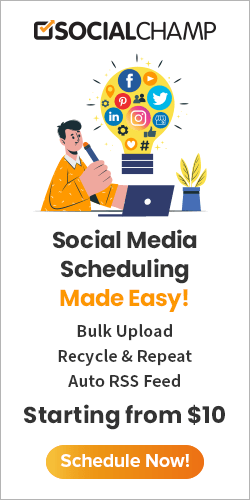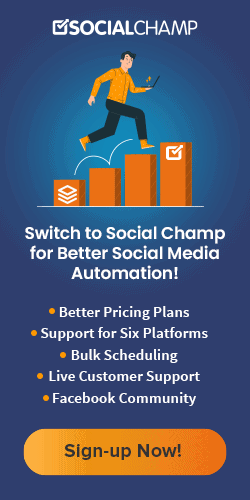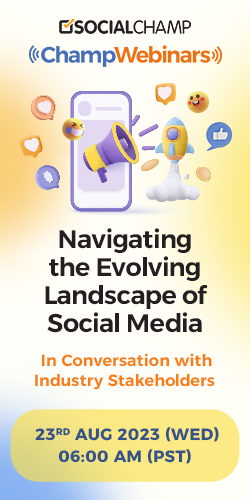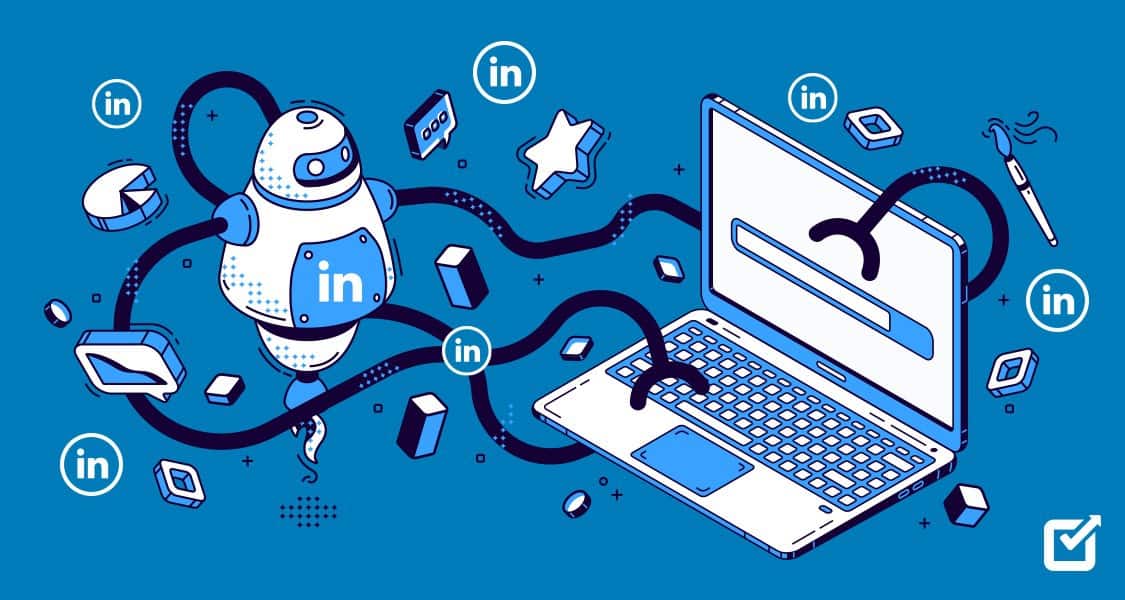If you want to increase your brand’s reach, awareness, and sales, and you haven’t thought about using Facebook to make your brand thrive, where have you been all this time? Facebook is used by 2.8 billion people every single month. And not just that, many businesses use automation to auto post to Facebook so that they don’t have to do it all manually.
In other words, Facebook isn’t just a place to share your life’s important moments with your friends; it’s also the perfect social media platform for finding potential customers and connecting with them no matter what kind of business you run. Two-thirds of Facebook users visit a local business page on Facebook every week. So, how can you use Facebook Marketing for your brand?
What Is Facebook Marketing?
Facebook marketing is simple. It involves using Facebook to market your brand or business to reach more people. People spend thirty percent of their time scrolling on social media, and Facebook users spend 35 minutes on the application.

(Source)
These numbers are pretty enticing for people looking for ways to improve their marketing and branding because 39% of regular Facebook users follow Facebook business pages to stay in touch with special offers and discounts, and 74% visit the application daily.

(Source)
As a business or brand owner, you can use Facebook to market your work in different ways like:
- Business branded groups
- Targeted ads
- Facebook marketplace
- Facebook jobs
The kind of Facebook marketing strategy you use eventually depends on the type of audience you want to cater to. Most of the time, we see people sticking to targeted ads with consistent posting, and it bears good results in the shape of an increase in overall engagement. You can, however, use other methods to make your brand grow.
But Why Is Facebook Marketing So Important?
Let’s find out:
Global Exposure
Facebook is the most used social media platform, and 1/3 of the world’s population is on the app. What does that mean for someone who runs a business? You can use pages, groups, and ads on the platform to market yourself to a diverse audience and interact with them via discussion threads.
6 million businesses used ads to reach their target audiences in the last quarter of 2019. Imagine what you can do with Facebook ads and their gigantic reach.
Target Your Potential Clients
Paid Facebook ads provide marketers with an opportunity to only target potential customers depending on their demographics and interests. For example, if you sell skateboards, you can target people under 25 who are more interested in using things like skateboards and powerboards. Facebook allows marketers to show their advertisements within their local vicinity for super-specific targeting.
Or you can re-target users who have visited your website before, thus narrowing down your target market and interacting with visitors in a better way. Lastly, posting visual content about your products can help you target potential customers on Facebook as more than 500 million people watch videos on Facebook daily. So, you can use many ways to promote your brand on Facebook.
Target Potential Clients With Social Champ
Use Social Champ to maximize your social media marketing efforts by scheduling and tracking posts using a single unified dashboard.
Align With Both B2B and B2C Businesses
Facebook is not just for B2C business; B2B businesses can also use it to market their offerings. Surprisingly, business decision-makers utilize 74% more of their time on Facebook. However, B2B marketing is competitive on Facebook. But if you have the right ad format, messaging, targeting, and user experience, then you can succeed.
Facebook offers the following targeting segments to B2B businesses so that they can target new users:
- Job title
- Employer name
- Employment industry
- Employer company size
- Interest industry
- Business travelers
Moreover, you can also make lookalike audiences based on your existing metrics like an email list, website visitors, customer base, etc.
Increase Brand Loyalty
Facebook is the perfect social media platform to have quick interactions with your customers. When you talk to your clients on Facebook, you end up naturally nurturing brand loyalty. When you interact with customers and answer their queries right away, you make them realize that you care.
Since more and more people are downloading Facebook and more and more brands are turning to Facebook for marketing, if your followers feel that you are not appreciating them the way other brands do, their loyalty towards your brand will falter.
Psychographic Targeting
Facebook lets you target customers even beyond demographics. For instance, not all millennials have high college debt, so Facebook enables you to use other characteristics like hobbies, life events, behaviors, interests, etc., to target customers.
This psychographic targeting lets you target with accuracy and precision. It also helps you align your digital marketing strategy with your offline marketing tactics, so you can make sure that you use the same behavioral criteria across the entirety of your marketing channel mix.
Increase Traffic to Your Website
Facebook marketing also allows you to increase your web traffic by letting you share links to your website and its landing pages on your Facebook profile or page. These links take your audience directly to your website. This makes your audience more receptive because they intentionally visit your website by clicking on your provided links.
Once they go to your landing page, they’ll automatically become more exposed to your marketing strategy in the form of a call-to-action (CTA).
So, it is super important to fill out every section carefully on your Facebook page because you can use this unique feature to your advantage by boosting the potential customers that your page could reach.
Therefore, add your website, logo, and contact information to show your followers that you are serious about your business and customers.
Facebook Marketing: Important Terms & Definitions
Facebook Reach
Your Facebook reach is the total number of unique Facebook users who visit your page or see your page regardless of if they engage with it or not. For example, if you post something and 100 users view it. Your Facebook reach will be 100. Sounds simple, doesn’t it?
However, Facebook measures your reach within a specific timeframe, for example, 28 days. In other words, a particular metric for Facebook reach doesn’t really exist, so you need to focus on your weekly, monthly, or daily Facebook get.
Facebook reach is affected by several factors such as:
- Audience targeting
- Budget
- Bid

Facebook calculates reach by using sampled data which is an approach used in data analysis. It involves using a portion of data instead of the entire set for analysis. Even though it doesn’t use all the data in a data set, the portion of data used acts as a suitable representation of the more extensive data and delivers similar results.
Plus, sampling provides accurate data, so your Facebook reach is to the point. Moreover, sample decreases the time required to query data; this gives advertisers a chance to get the metrics they need to manage their business on Facebook efficiently and quickly in Ads Manager.
Facebook Group Badges
Facebook recently announced Facebook Group Badges. It is a new visual feature that allows people to learn more about their group members. There is a wide array of group badges ranging from badges for admins to badges for founding members. These badges appear next to a member’s name in comments, member profiles, and group posts. Let’s look at Facebook Group Badges:


- Admin and Moderator: Group leaders (group admins and moderators) enable a group’s moderation team to keep the community safe and engaged.
- New Member: This badge is for new members, and it plays an instrumental role in making newbies feel supported to build community.
- Conversation Starter: This is for group members who start meaningful and engaging group discussions and get the most comments and likes in the past month.
- Founding Member: This badge is for members who have contributed to the growth of a group and joined the group within the first three days of its creation.
- Conversation Booster: This is for members who engage in discussions, encouraging other members to participate more.
- Visual Storyteller: This badge is for unique contributors whose videos or photos other group members find valuable.
- Rising Star: This badge recognizes new group members who contribute to the community within the first month of their joining while receiving the most comments and reactions on their posts.
Facebook Engagement
Facebook engagement is an action performed by a person on your post or comments on your pages, groups, and ads. This includes any action such as link clicks, comments, reactions, and shares, etc.
Facebook measures engagement for individual posts, pages, and Facebook groups as a whole. To increase your engagement, you need to post at least 2-3 times every week.
How to Build Facebook Marketing Strategy?
Step 1: Establish Marketing Goals
Before you even start working on your strategy, give yourself a target to aim at and set a goal for yourself. Here are some goals businesses have while creating a marketing strategy on Facebook:
- Strengthen brand awareness.
- Drive referral traffic.
- Generate leads and conversions.
- Build a relationship with your audience.
- Provide customer service.
Choose a goal for yourself before proceeding to the next step.
Step 2: Pinpoint Target Audience
Any Facebook marketing strategy will be useless without the right audience to target. If you are not even reaching the right people, what is the point of your marketing strategy?

You must find your audience no matter what niche they belong to. An excellent place to start is the Facebook Ads Manager. It allows you to create a custom audience. From there, you can create your audience by choosing from a list of options based on the information you already have about your target audience. Once you have created your audience and saved it, you can use it in the future and adjust as needed.

Also, keep an eye on the audience size, which should stay in the green range of the meter. The red range means that an audience is too specific, while yellow indicates a broad audience. So, stay green!

Step 3: Set Your Budget
The next step is to plan a budget. Before you decide on a monthly budget, look at your initial goals and your goals for the future. Your marketing budget should cover content creation, lead generation ads, conversion ads, and page-like ads.
Page-like ads will grow your followers on Facebook but you will have to invest in it. A large number of followers can increase your profits in the long run. An increase in followers also increases credibility, reputability, brand awareness and makes your business look trustworthy to people as a consequence.
On the other hand, conversion ads increase sales, and lead ads are the ones that generate leads that you can turn into clients. Lastly, content is technically free! However, if you hire someone to create content for you, then it will cost you money.
Boost your content if you want more people to see your content and ads. You don’t even have to use a lot of money. A tiny amount goes a long way in boosting to make your post visible to more people. The best part is that you can boost your ads to people other than your followers too.

Once you decide your budget, start dividing it into different sections based on much you should spend on every section. The best way to figure this out is the trial-and-error method. Just keep making adjustments along the way to perfect a budget.
Step 4: Plan Engaging Content
There are multiple Facebook best practices for creating an engaging marketing strategy. But the first thing is always to plan engaging content. Start planning your posts a month or two in advance and follow a consistent posting schedule like 3 posts every week.
You can also try the three-sentence rule for your copy. It involves using each sentence to grab attention, add value, persuade an action (CTA), respectively. However, you also need to see that your CTA makes your followers do something like watch a video, click on a link, tag a friend, share on their timeline, etc.
Keep promotional posts to a bare minimum, i.e., one-third of your total content. Make people go to your website if they want to know more. And if you’re going to establish yourself as a brand leader and get maximum interaction, you need to start asking questions that provoke discussions and responses.

Another strategy you can apply to increase engagement is by asking people to tag their friends and family. And the third thing you can do is host a giveaway or a contest by offering freebies and gifts to people. Ask them to comment, like, save, and share to win something exciting.
This works great for boosting follower count too!
Step 5: Plan Engaging Ads
Follow Facebook’s rules for posting ads such as:
- Keeping the image sizes for a conversion ad and a page-like ad within 1200 × 628 pixels and 1200 × 444 pixels, respectively.
- Keeping text ratio under 20% in an image.
Make sure that you add a CTA in your ad copy based on your ad objective. Try using a three-sentence strategy for your ad’s caption. However, beware of the character limit for Facebook ads. Keep your target audience when creating ads and come up with a CTA accordingly as well. Some good CTAs are:
- Like our page for discounts
- Keep an eye out for updates
- Shop Now
- Click Now
- Learn More
- Download our app for free today
Or you can provide people with an incentive such as a discount. Discounts and promo codes work wonders when it comes to turning a warm audience into real clients.
Step 6: Monitor Your Facebook Page Daily
As soon as you get your planning, ads, and budget finalized, you need to start closely monitoring your Facebook account. Make sure that you respond to messages and comments from Facebook users. If you don’t reply to people on time, they will feel discouraged and stop engaging with your account.
Express your gratitude when you receive any positive or uplifting review or comment to increase the probability of making someone a regular customer. Plus, monitoring will help you catch any errors like typos, spellings, grammar, etc. You can spot the mistakes before anyone else does and do the required to correct them.
Lastly, see to it that your scheduled posts get published properly. Respond to messages ASAP. Trust us; you do not want to have a low response rate.
Step 7: Do A/B Split Testing
Now that you know what to do to devise a foolproof Facebook marketing strategy and you’ve also started executing it, you need to optimize everything continually. That is where A/B split testing comes in when working on Facebook marketing.
A/B split testing allows you to compare small variations of your marketing strategy to see what performs better and delivers the best results. You can use Facebook’s metrics for A/B split testing to optimize your Facebook marketing strategy. Access Facebook insights by clicking on your Facebook page and going to “Insights” on the top bar from there.

You will get all the necessary statistics about Facebook Ads Manager’s cost per click, CTR, and total ad reach.
And that’s all you need to know in order to create a kickass marketing strategy.
13 Tips to Execute a Successful Facebook Marketing Strategy
The key to success on Facebook is to use it for what it was intended for: connecting with people. To help you get started, here are 13 tips for a successful Facebook marketing strategy.
Establish a Goal for Your Facebook Marketing Strategy
Before you start posting and promoting your Facebook page, you need to establish a goal for your marketing strategy. What are you trying to achieve? If you’re trying to grow your email list, posting daily could be a waste of your time.
Only a simple professional page of your company with some relevant, high-quality posts would be sufficient. To grow your email list, you can run an ad on Facebook for ‘Lead Ads,’ which will help grow your email list fast. Afterward, start sending personalized emails through a DMARC protected email domain to your leads. It is one of the best techniques to generate leads on Facebook, which most organizations use continually to achieve their business goal.
Set solid goals for your brand. Strong goals related to your brand’s objectives are crucial to design a foolproof Facebook marketing strategy. Every brand has different goals but they must be centered around the actions that can impact its bottom line.
This can include:
- Increasing conversions on the website
- Generating leads
- Improving your brand’s customer service
Once you’ve your goals, map out ways to get there. You can use SMART goals or the OKR goal framework for this purpose. Create a Facebook mission statement and Facebook-style guide.
Define Your Target Audience
To target your audience effectively, you need to know who you want to target first. Asking the following questions can help you narrow it down:
- How old is your audience?
- Where do they live?
- What do they do for a living?
- What challenges do they face?
- When and how do they use the app?
Then move to general demographics. Use Facebook Audience Insights for that.
It can provide information like gender, age, relationship status, education, location, language, and Facebook usage. Use it to target your audience.
Plan Your Content
You now have your target audience and goals. Let’s get posting!
We recommend using the “80-20 Rule” (80% information and 20% brand promotion) when planning content. Don’t bore your audience with constant promotion. Provide them value-addition content so they can open themselves up for hearing about your brand 20% of the time.
Consistency is super important. Use Facebook tools like Social Champ to schedule Facebook posts. Decide when to post. The best time to post on FB is 8:00 AM – 12:00 PM on Tuesdays and Thursdays. You can also use Page Insights to find out more.
Optimize for Engagement
The first step to having a successful Facebook marketing strategy is to create a page that stands out. A good page will have a specific purpose and can easily be associated with your brand’s identity. That means you need to have a good Facebook logo, a great picture of your team, and, most importantly, a compelling description.
If you want to keep things as simple as possible, a general description could read: “What’s your story?” and, “Here’s a brief insight to get you going.” Showcasing your skills is the best way to tell your Facebook followers that you’re an expert in your field.
Show them through photos and videos that you know what you’re talking about. When they post comments on your page, you must react or reply to them if necessary so that they should feel like you’re really listening to them.
Do cross-promotion to make the audience find your Facebook Business Page. Link your Facebook page in your newsletter and email signature. Add Facebook Like and share buttons on your blog, landing page, or website.
To increase engagement, get chatty. Answer questions, reply to comments and messages, constantly audit your page and its information.
Create a Call to Action
To get started, your Facebook Page should be clear on the types of appropriate posts for the platform. While some of your posts will be advertisements, others will be informative or in support of your mission.
Before making a post, consider how you will direct potential customers. Is it more effective to get a customer to like your page, join your email list, or purchase a product? It is essential to consider how your posts will be relevant to your current audience.
Do they want to know more about your product but have no time to go through a lengthy web page? You can use a question to get their attention. For example, if you are promoting a new cell phone case, you could ask, “Which phone case is better?
Post on the Right Frequency
When it comes to Facebook marketing, less is more, and that is the only way to ensure that you are leveraging Facebook Algorithm. Too many posts will just get you a ton of passive and not much activity. Plus, the more posts you make, the more you’re exposing your content to the general public. This can turn off potential customers who are not interested in seeing a bunch of promotional posts.
You’ll also be on track to lose followers if you continuously post content too often. There’s a formula for when to post, as well. Do it based on your audience’s likes and dislikes. Be strategic, don’t go crazy! Use a good image Facebook posts need to be easy to share. If they’re not, don’t bother.
Use Facebook publishing tools. It will give you various options for your post. You can schedule your post for a future date and time. It provides a draft facility like Gmail where you can keep unpublished, incomplete posts.
Engage With Your Audience
Your business should create content to engage with your target audience. But, as we all know, consumers these days are pretty smart. If you don’t take the time to create content, customers will skip it and probably give your business a bad review instead.
One of the most valuable things you can do to promote your business is to create a long-term marketing strategy that includes engaging with your audience. If you’ve done your research correctly, you’ll be able to learn about the topics your target audience is most interested in.
And try to create content on similar or related topics. Then you can add your company’s expertise to the conversation, give your audience the information they need, and provide value.
Customize Posts for Different Audiences
First, you need to understand what you’re trying to achieve. For instance, if you aim to increase awareness of your products on Facebook, then focus on posts with great visuals or explainer content. If you’re trying to drive traffic to your website, focus on posts with a link to your homepage.
All of these different types of posts can drive traffic, so keep an eye out for the best engagement and click-through rates. Log on to the Facebook business suite to manage your Facebook page. From here, you can see which posts your followers like, unfollow or dislike and see engagement stats.
From here, you can create posts, keep them in draft, or schedule for future dates.
Stick to one picture per post for getting better audience engagement. According to a Harvard Business Review study, images get eighty-five percent of the engagement on Facebook.
Make Updates That Are Timely and Relevant
The secret to successful Facebook marketing is, being relevant. You can’t just post an ad on Facebook. However, you can update your page to meet the needs of your target audience. To help you meet that need, it helps to share what your audience is talking about.
If you’re a networking site, you can post status updates that are in touch with the latest on those sites. Monitor the demographics. You can’t just target everyone, so you need to be extra diligent about choosing your target demographic. You’ll be able to do this by checking Facebook’s Page Insights tool.
Use Visuals to Tell The Story
Users will get the most value out of Facebook if they understand what you’re selling. Using visuals helps customers to know what you’re selling and what your company is all about. Use images, videos, and infographics. This helps to add depth and a human element to your posts. Profile Post on your page first.
This will give you a chance to promote your posts to your friends. Make sure that your profile looks professional. If you have a company profile that can be seen in people’s news feeds, be sure to keep it clean and professional.
It also helps to use pictures and place links to your products in your profile. Use a professional cover photo. Think about your followers’ demographics, and then pick a cover photo that fits the rest of your profile.
Promote Facebook Page on Other Social Handles
Nowadays, promoting a Facebook page only on Facebook is not enough; you should consider promoting it on different media, like Google, Reddit, and Quora.
The best way to promote your Facebook page on Google is, create a blog on your website and mention your Facebook page there and also, don’t forget to give a link about the page so that the audience can easily reach you with a simple click. You can share your page post on Reddit.
The other important channel is Quera. Go to Quora to answer the questions related to your business and give a link to your Facebook page for detailed information about your company and products.
Incorporate Facebook Pixel and Facebook Ads
Everything is done! Now you need to reach more people. With Facebook, things can be very uncertain. Even the best content needs some boost with Facebook Ads.
Use Facebook Ads to share your post with a targeted audience. And if you don’t want to do that, use Facebook Pixel to:
- Monitor your conversions
- Remarket to users who have visited your site
- Build specific audiences for future ads
And there, you have the easiest way to set up a Facebook Marketing Strategy!
Make the Most of Facebook-owned Tools
Facebook marketing for small businesses can be quite hectic as the team is small, and there are not many people out there to help you out. This is where companies can focus on Facebook-owned tools and Social Champ to make their work super streamlined. Here are a few Facebook tools that can help you out immensely.
- Facebook Business Manager: To manage organic and paid Facebook posts and work with team members, outside contractors, and external agencies.
- Facebook Groups: To drive engagement by sharing information and ideas and showcasing your expertise to people.
- Facebook Chatbot (Facebook Messenger Bot): To be supremely responsive to customers and their messages.
These tools will help you up your game even when you’re busy.
Streamline Facebook Management With Social Champ
Facebook marketing does not need to be tiresome if you have the right tools. Use Social Champ to manage your Facebook marketing and get access to multiple amazing features!
Amazing Facebook Campaigns That Took the World by Storm
It is pretty common to run out of Facebook post ideas. Therefore, there is nothing wrong with trying to look for a bit of inspiration. Here are some amazing Facebook campaigns that have taken the world by storm.
Go Pro
Everyone and their dads are aware of GoPro’s annual million-dollar campaigns. To launch their new HERO9 camera, they yet again announced the contest in December 2020 and asked all followers to share their raw, unedited films and clips.
All the lucky winners will win an equal share of their $1 million. Within the next two months, there were 29,000 entries. The contest was a success, and they didn’t even need to market their product!
Make-A-Wish Foundation
Make a wish foundation runs multiple different Facebook marketing campaigns in collaboration with other brands to help raise awareness. They have previously partnered with Omaze, BuzzRx, Disney Land, Robin Factory, and many more!

All their campaigns have ended up with 1 million + donations for their foundations, which means that it is safe to say that they are nailing their Facebook marketing campaigns.
Starbucks
And lastly, legit every campaign by Starbucks. We are all familiar with the cozy vibes that they radiate from their posts and how their Facebook page reminds us of homely comfort.
From running holiday season campaigns to releasing limited edition drinks, they do it the best!

I mean just look at that post!
So, What Are You Waiting For?
So, I have tried to cover all the basics and inspiration you need to make your Facebook marketing successful. From importance to strategy curation, this guide covers it all. All you need to do now is have fun and make your Facebook marketing game strong. Good luck to you all!






























